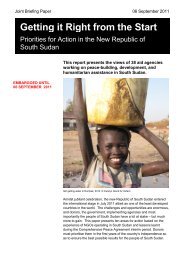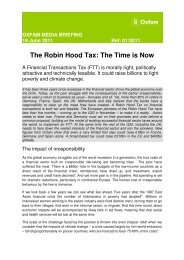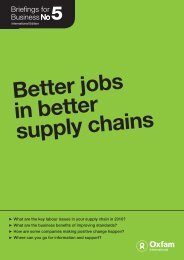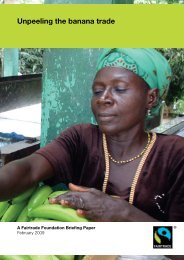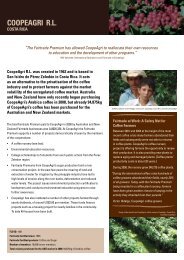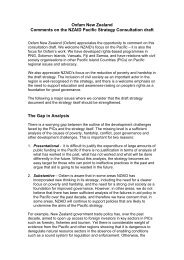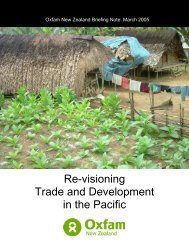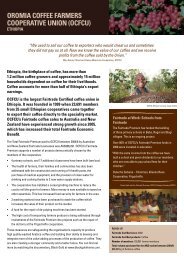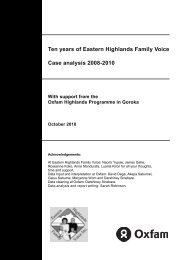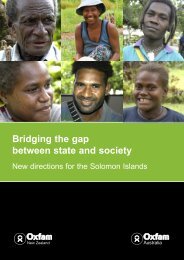Better returns for business.pdf - Oxfam New Zealand
Better returns for business.pdf - Oxfam New Zealand
Better returns for business.pdf - Oxfam New Zealand
- No tags were found...
You also want an ePaper? Increase the reach of your titles
YUMPU automatically turns print PDFs into web optimized ePapers that Google loves.
THIRTY EIGHTThe other issue that was highlighted acrossthe workshops is that investors rely heavily oncompanies to provide data and in<strong>for</strong>mation ontheir exposure to and management of povertyand development issues. Yet, the reality isthat corporate reporting is often incomplete;it is also, because of inconsistencies in theindicators used, difficult to directly comparecompanies’ per<strong>for</strong>mance. Investors have,through their support <strong>for</strong> initiatives such asthe Carbon Disclosure Project and the GlobalReporting Initiative, tried to address thisproblem by encouraging companies to reportsocial and environmental in<strong>for</strong>mation in astandard, consistent <strong>for</strong>m. While these ef<strong>for</strong>tshave made an important contribution to, inparticular, increasing the number of companiesthat do produce such reports, it is clear thatmore is required.We have four recommendations <strong>for</strong>institutional investors.1. To lend their time and resources to relevantprojects and initiatives to develop these tools.For example, the BRBW workshop focusing ontransparency, bribery and corruption highlightedinvestors’ need <strong>for</strong>, and interest in, developinga tool that would enable them to evaluatecompanies’ potential exposure to bribery andcorruption (e.g. as a consequence of operatingin particular countries or in specific sectors) andcompanies’ systems, processes and controlsto manage these risks. Participants agreed thatthis was a project that they, and other investors,should collaborate in, probably in conjunctionwith an organization such as TransparencyInternational.2. To encourage the sell-side (investmentbanks) to focus much more on poverty anddevelopment issues than has been the caseto date. This will provide further impetus tothe development of investment-relevant toolsand, perhaps more importantly, will signal toinvestment managers that these are investmentrelevantissues and so need to be explicitlyconsidered in investment decision-making.3.To engage proactively with relevant civilsociety organizations when they are developinganalytical tools or producing research. Thepotential value of these organizations washighlighted in the case of the BRBW labourstandards workshop (see Box 5), where theywere able to challenge some of the centralassumptions in what looked like a plausiblepiece of investment research, and were alsoable to provide a more nuanced assessmentof the issues investors should be consideringand the implications of investors’ responsibleinvestment activities4.In their dialogue with companies, to movebeyond simply encouraging companiesto report, and focus much more on thecompleteness and quality of the data, with aparticular focus on encouraging companiesto report in a <strong>for</strong>m that enables meaningfulcomparisons to be made. Investors shouldensure that companies conduct, and reporton, environmental, social and human rightsdue diligence 53 of their activities and projects.Equally, all Environmental & Social ImpactAssessment (ESIA) reports need to be publiclydisclosed and open <strong>for</strong> independent verificationand monitoring.INVESTORS RELY HEAVILY ON COMPANIESTO PROVIDE DATA AND INFORMATION ONTHEIR EXPOSURE TO AND MANAGEMENT OFPOVERTY AND DEVELOPMENT ISSUES.Governments need to lend their weight to theseef<strong>for</strong>ts and require companies to: (a) produce acomprehensive corporate responsibility report,building on the frameworks developed by theGlobal Reporting Initiative and similar disclosureinitiatives; (b) include relevant in<strong>for</strong>mation about(ie. financially material or significant from anenvironmental or social perspective) social andenvironmental issues in their reports to theirshareholders. 54



